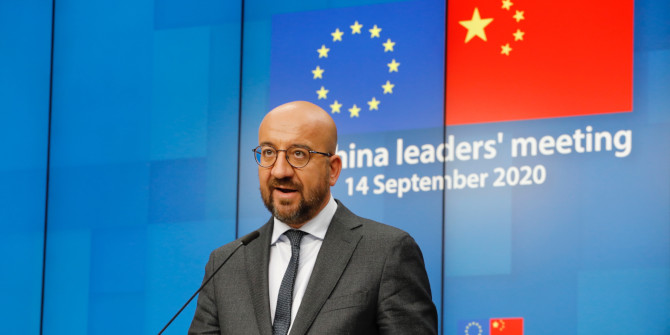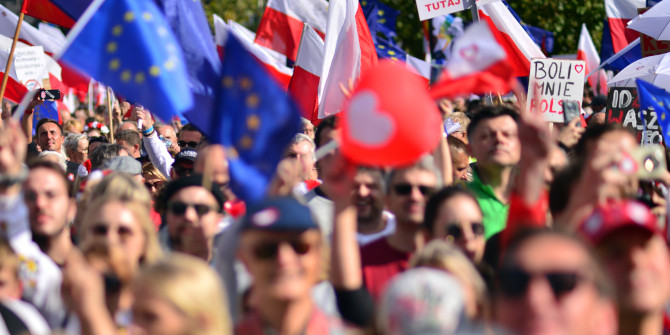Russia’s invasion of Ukraine has raised concerns in Estonia, Latvia, and Lithuania that they could also come under attack. Michele E. Commercio explains how the Baltic states’ membership of NATO will ensure their security in the face of Russian aggression.
While Putin’s invasion of Ukraine has generated concern – to say the least – in neighbouring post-Soviet states like Estonia, Latvia, and Lithuania, these countries are in a fundamentally different situation than Ukraine that, in effect, renders them secure from Russian aggression.
Heightened security concerns voiced by Baltic elites are grounded in the reality that is unfolding in Ukraine. Baltic elites watched Russia annex Crimea in 2014, start a secession war in the Donbas region, recognise the independence of Luhansk and Donetsk, and then viciously invade the country. These security concerns are also grounded in the ugly history experienced by the Baltic peoples in 1940, when the Soviet Union illegally occupied and annexed three independent states while the international community essentially looked the other way. Estonians, Latvians, and Lithuanians were then subjected to Moscow’s political, economic, and cultural control until the Soviet Union collapsed in 1992.
In addition, the security concerns of Baltic elites are grounded in democratic values that underpin a Baltic perspective on sovereignty that unambiguously supports an independent state’s right to maintain its territorial integrity and manage its own domestic and foreign affairs. And finally, these security concerns are grounded in geography: all three Baltic states border Russia, and Latvia and Lithuania border Russia’s close ally in its war against Ukraine – Belarus.
And so, it is not surprising that Baltic elites voiced, and continue to voice, apprehension over Putin’s invasion of Ukraine. Lithuania’s Foreign Minister, Gabrielius Landsbergis, for example, has argued that “the battle for Ukraine is a battle for Europe,” and warned that “if Putin is not stopped there, he will go further.” The state secretary of Latvia’s Defence Ministry, Janis Garisons, issued a similar warning: “Russia always measures the military might but also the will of countries to fight… Once they see a weakness, they will exploit that weakness.” Adopting a more cautionary position that entails close monitoring of the situation, the director general of Estonia’s foreign intelligence service, Mikk Marran, argued that as of February 28, 2022, Russia posed no direct military threat to Estonia: “It is calm next to our borders [with Russia]. The troops from there have been taken to fight in Ukraine. But we are monitoring the situation closely.”
These sentiments underly a common Baltic position on Putin’s invasion of Ukraine. All three states have condemned Russia’s aggression and taken concrete steps to support Ukraine’s sovereignty: they have advocated for punitive sanctions against Russia and Belarus, sent military and humanitarian aid to Ukraine, and urged NATO to adopt measures to ensure the security of its member states, particularly those that border Russia. These measures are having an adverse effect on Putin’s ability to achieve a swift, decisive victory. In fact, along with an admirable Ukrainian President who deserves to be and will likely be the next recipient of a Nobel Peace Prize and an astounding commitment on the part of Ukrainian troops and civilians to defend their country, these measures are crippling Putin’s ability to bring Ukraine to its knees.
The most important factor that sets the Baltic countries apart from Ukraine in this context is their membership in international organisations like the European Union and the North Atlantic Treaty Organization. Much to Putin’s publicly expressed chagrin, the Baltic states joined the EU and NATO in 2004. The benefits of EU membership are many, but the most pertinent in terms of security are the organisation’s commitment to political cooperation and strengthened economic ties, and its guarantee that it will protect a member state’s democracy and rule of law. We have seen the EU’s response to what it deems ‘democratic backsliding’ in Poland and Hungary; we can imagine the EU’s response to threats to Baltic democracy stemming from an external actor like Russia. It is no surprise that President Zelensky has, in the midst of Putin’s invasion, submitted an application for Ukraine’s membership in the European Union.
NATO membership directly addresses security concerns. Collective defence, or the notion that an attack against one NATO member is deemed an attack against all alliance members, is enshrined in Article 5 of the Washington Treaty, which has only been invoked once in reaction to the 9/11 terrorist attacks against the United States. When the Baltic states became members of NATO, they acquired a guaranteed collective defence of their countries by NATO forces in the face of Russian aggression.
Perhaps more important is NATO’s enhanced forward presence in Poland and the Baltic states, triggered in 2016 two years after Russia annexed Crimea. NATO describes these forces as follows: “These battlegroups, led by the United Kingdom, Canada, Germany and the United States respectively, are multinational, and combat-ready, demonstrating the strength of the transatlantic bond. Their presence makes clear that an attack on one Ally will be considered an attack on the whole Alliance.”
In my view, this description was written for President Putin, who is certainly cognisant of the fact that an invasion of any Baltic state will indeed trigger a collective NATO response. That deterrent is sufficient to maintain the territorial integrity of Estonia, Latvia, and Lithuania. Given the fact that Ukraine transferred its nuclear warheads to Russia by 1996 and in so doing lost a powerful deterrent, NATO membership remains the most critical deterrent for Ukraine today.
Note: This article gives the views of the author, not the position of EUROPP – European Politics and Policy or the London School of Economics. Featured image credit: NATO North Atlantic Treaty Organization (CC BY-NC-ND 2.0)






“Collective defence, or the notion that an attack against one NATO member is deemed an attack against all alliance members, is enshrined in Article 5 of the Washington Treaty, which has only been invoked once in reaction to the 9/11 terrorist attacks against the United States.” Yes, and NATO lost the war.
Lost? Where’s Osama bin Laden then?
The purpose of a war is to produce a political effect, to bend the enemy to your will, as Clausewitz put it. Who bent to whose will? We established a government in Afghanistan. Where is that government now? And what is the status of al Qaeda? Note the recent report of the UN Security Council, S/2022/83, esp. para. 57: “There are no recent signs that the Taliban has taken steps to limit the activities of foreign terrorist fighters in the country. On the contrary, terrorist groups enjoy greater freedom there than at any time in recent history.” Decapitating one leader is not the same thing as winning a war. The Israelis killed Sheikh Yassin, who founded Hamas. He was replaced by Rantisi, who was also killed. He was replaced and Hamas has continued to operate. Decapitation has not proved to be effective in achieving political objectives.
NATO will not defend Ukraine because doing so risks nuclear retaliation from Russia. How does defending a NATO member not ALSO risk nuclear retaliation? I think NATO will not step up and Putin has figured this out. We are back in the pre-MAD era of mechanical trench warfare by attrition.
The fact is NATO due to the US ‘seeing no danger’ and subsequent nuclear posture at this time is inviting and rewarding a Russian surprise nuclear first strike, thus adding a nuclear 9/11 or nuclear Pearl Harbor to the long and recent list of spectacular intelligence failures. Please NATO wake up to the fact that we’ve let Putin get away with far too much and all he sees is weakness and the chance of a nuclear first strike being winnable.